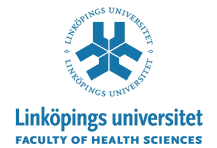 |
Visa svensk kursplan |
|
COURSE CATEGORY Single subject course MAIN FIELD OF STUDY SUBJECT AREA |
COURSE CODE | 8FA028 |
Learning Outcomes;
By the end of the course the students will be able to;
-Describe the mode of action of different micro organisms pathogenic to humans
-Define the interactions between the human host and the infectious agent, from molecular to clinical level and apply this knowledge to describe clinical manifestations.
-Apply the principles of mode of actions of virulence factors on the defence of the human body.
-Understand, analyse and critically discuss scientific papers in the field of the course topic.
-Design, set up and carry out laboratory experiments to investigate molecular mechanisms in the interactions between micro organisms and human cells.
-The host response to infectious micro organisms
-Virulence strategies and mechanisms exerted by the pathogenic micro organism
-The ecology of human flora of micro organisms - normal flora and pathogens
-Micro organisms and the immune system
-Vaccines and vaccine development
-Antimicrobial agents and resistance to them
-Epidemiology of human infectious diseases
-Zoonosis
-Infectious diseases in perspective of global medicine
-Emerging infectious diseases
-Infections and human genetics
The course will contain four main themes:
-Biomaterial related infections
-Infectious diseases and global medicine
-Chronic infections
-Infections related to mother/child
The educational method used is partly developed from problem-based learning (PBL). PBL emphasises the student´s development of free, self-supporting, lifelong learning ability as an instrument for critical inquiry. The students own queries and problems formulated form the basis of PBL. Important is also the student´s ability to take responsibility for his/her own learning, and to seek and evaluate information and knowledge as well as to develop co-operative skills and a flexible attitude to different views and ideas.
Students who have failed the course or part of the course twice are entitled to request another examiner for the following examination occasion.
Extent of re-examination
The extent of re-examination shall be similar to the regular examination.
Entries for examinations
Rules for entries for examination are given in the course plans. In addition the "Regulations regarding examination and examiners" laid down by decision of Linköpings University (Dnr LiU 1109/00-40) apply.
Applicants with a degree from a non-Swedish university must enclose an official examination certificate of at least three years of full-time studies in subjects with relevance for Life Science, such as biology, chemistry, medicine or similar.
Documented knowledge of English equivalent to ”Engelska B”; i.e. English as native language or an internationally recognized test, e.g. TOEFL (miminum scores: Paperbased 550 + TWE-score 4.0, computerbased 213 and internetbased 79), IELTS, academic (minimum score: Overall band 6.0 and no band under 5.0), or equivalent.
Planning and implementation of the course shall be carried out on the basis of the wording in this course plan. The evaluation of the course should therefore consider the question how well the course agrees with the course plan. Written evaluation will be arranged at a scheduled time at the end of the course.
Electronic evaluation of the course will also take place in accordance with Linköping University´s regulations (Dnr LiU 780/06-04).
Certificate
At the student´s request, a course certificate may be issued by the director of studies for courses or, according to delegation, by the head of the department/director of program studies.
Additional Information
The course is given in such a way that both men´s and women´s experiences and knowledge are made visible and developed.
If the course is withdrawn, or is subject to major changes, examinations according to this course plan are normally offered on a total of three occasions within one year, one of them in close connection to the first examination.
|
||||||||||||||||||||||||||||||||||||||||||||||||||||||||||||||||||||||||||||||